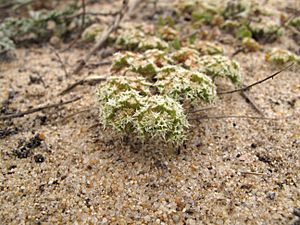Monterey spineflower facts for kids
Quick facts for kids Monterey spineflower |
|
|---|---|
 |
|
| var. pungens | |
| Conservation status | |
| Scientific classification |
|
| Kingdom: | Plantae |
| Clade: | Tracheophytes |
| Clade: | Angiosperms |
| Clade: | Eudicots |
| Order: | Caryophyllales |
| Family: | Polygonaceae |
| Genus: | Chorizanthe |
| Species: |
C. pungens
|
| Binomial name | |
| Chorizanthe pungens |
|
| Script error: The function "autoWithCaption" does not exist. | |
Script error: No such module "Check for conflicting parameters".
Chorizanthe pungens is a type of flowering plant. It is often called the Monterey spineflower. This plant belongs to the buckwheat family. You can only find it in California, which means it is endemic there. It grows from the San Francisco Bay Area down along the Central Coast.
What the Monterey Spineflower Looks Like
This plant usually grows in coastal areas. You can also find it in the hills and mountains near the coastline. It can stand upright, or sometimes it spreads out along the ground. Its stems can grow up to half a meter (about 20 inches) long.
The plant's color can be green, gray, or even red. It usually feels hairy. Its main leaves are found at the bottom of the plant. There are also special leaf-like parts called bracts along the stem. These bracts are found where the flowers grow.
The flowers grow in a tight group. Each flower is surrounded by six hairy bracts. These bracts can be white or pink. They have hooked tips, which look like tiny hooks. The flower itself is very small, only a few millimeters wide. It has jagged parts called tepals.
Different Types of Monterey Spineflower
There are two main types, or varieties, of this plant:
- var. pungens: This is the more common type of Monterey spineflower.
- var. hartwegiana: This type is known as the Ben Lomond spineflower. It is only found in the Santa Cruz Mountains north of Santa Cruz.
The Ben Lomond spineflower is considered a federally listed endangered species. This means the United States government protects it because it is at risk of disappearing forever.
This special variety lives in a unique habitat called the Zayante sandhills. Other rare plants and animals also live in this sandy area. These include the Ben Lomond wallflower (Erysimum teretifolium) and the Zayante band-winged grasshopper (Trimerotropis infantilis). One big threat to the Ben Lomond spineflower and other species in this area is the destruction of their habitat. This often happens because of sand mining, which removes sand from the ground.
 | Selma Burke |
 | Pauline Powell Burns |
 | Frederick J. Brown |
 | Robert Blackburn |


